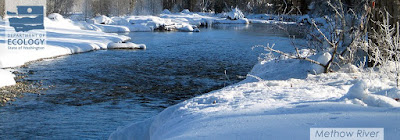Stormwater runoff is a leading pollution threat to lakes, rivers, streams and marine water bodies in urban areas of Washington State. As rain and snowmelt runs off rooftops, paved streets, highways, and parking lots, it increases in speed and volume, and can pick up pollution such as oil, fertilizers, pesticides, soil, trash, and animal manure. These pollutants are carried into local bodies of water, where they can impact water quality and habitat.
Under federal and state laws, the Department of Ecology issues permits to control harmful runoff pollution that can affect rivers, lakes, and groundwater across the state. The most-populated cities and counties have stormwater permits aimed at reducing stormwater pollution at its source, treating it, and controlling volume and flow, so cleaner water goes into our creeks, lakes, groundwater and Puget Sound.
You can submit comments on the draft permits from Aug. 15 through Nov. 14, 2018. Find all draft permits, supporting documents, and information on how to submit comments on our reissuance webpage.
 Three stormwater permits
Three stormwater permits
Municipal stormwater permits are divided into three categories: Phase I, Western Washington Phase II, and Eastern Washington Phase II. Permits are divided based on population and by geography. We separate the Phase II permits into east and west because differences in climate and how the land absorbs water require different stormwater management measures. We review and update these permits every five years to add new science and clarify requirements.What’s changing from the last versions?
Differences from the current permits include adding requirements for comprehensive stormwater planning and controlling sources of stormwater from existing businesses. We also refined language throughout to clarify: operations and maintenance, public education, controlling runoff for new and redevelopment, structural stormwater controls, and improving annual reporting. We also revised and added any new applicable Total Maximum Daily Load requirements.
Listening to stakeholders throughout the process
 We’ve gotten feedback from many stakeholders throughout this update process. In 2016, permittees, non-governmental organizations, and other interested parties organized a series of committee meetings to develop recommendations for permit revisions prior to starting the writing process.
We’ve gotten feedback from many stakeholders throughout this update process. In 2016, permittees, non-governmental organizations, and other interested parties organized a series of committee meetings to develop recommendations for permit revisions prior to starting the writing process.From February to April 2017, we hosted listening sessions in both western and eastern Washington, and we gathered email and online comments with more specific input. We considered these comments as we developed the permit revisions.
In western Washington, we also provided an additional public review opportunity in the fall of 2017 with an informal public comment session on preliminary draft permit language for specific topics. This extra step in the public process provided valuable input from a wide range of interested parties. We considered those comments as we developed these draft permits.
How to comment
Now we’ve begun our formal comment period, and we invite comments on the formal draft documents from Aug. 15 through Nov. 14, 2018. You can find all three draft permits and supporting documents, as well as information on how to submit comments, on our reissuance webpage.
We will also be holding a series of workshops and public hearings. Information on workshops and public hearings can be found on our public events page.
Once we end the comment period, we will review and respond to comments. Our response to comments will be included in the final permit documents. We intend to reissue the final permits July 1, 2019.



No comments:
Post a Comment
We will not post comments with links to commercial sites, so please do not include them! Thank you.
(Comments Policy)